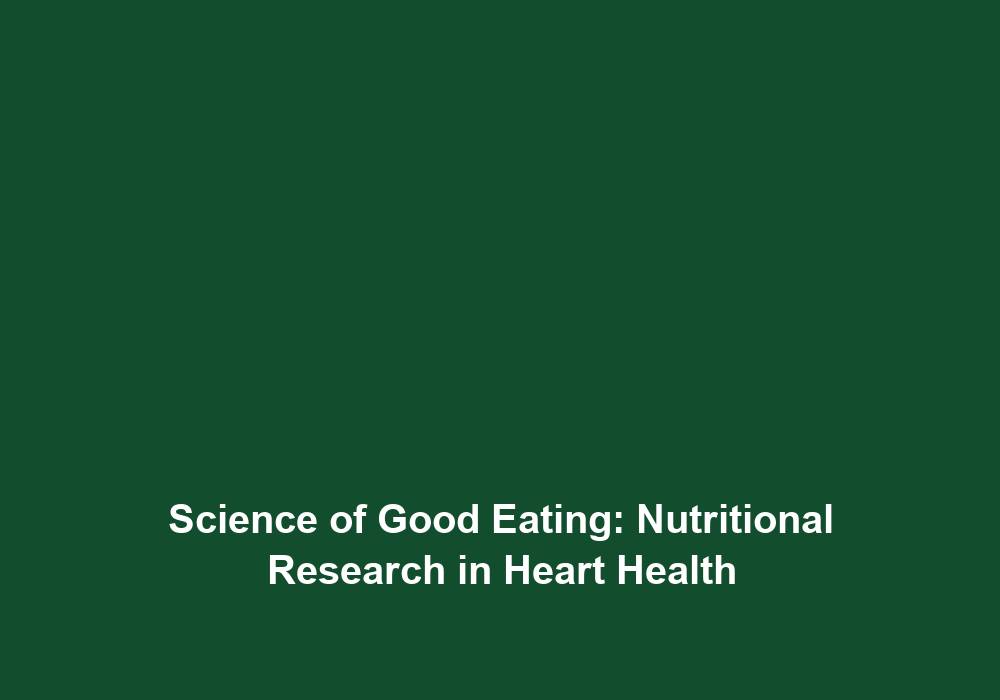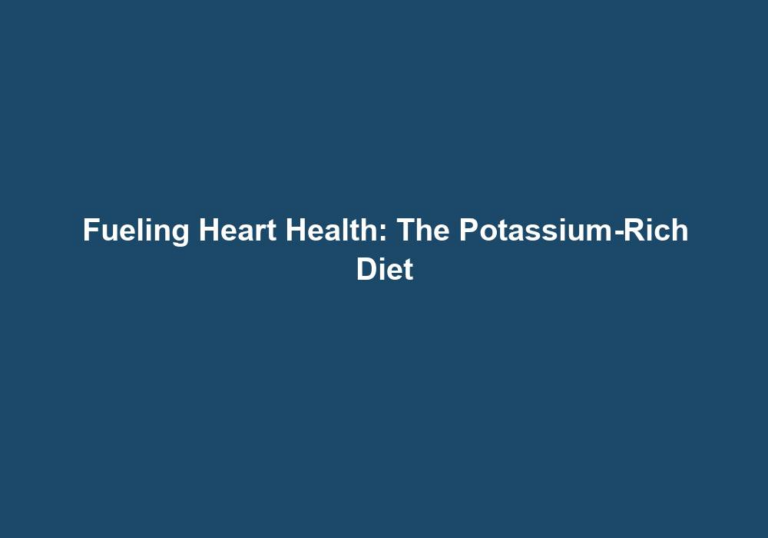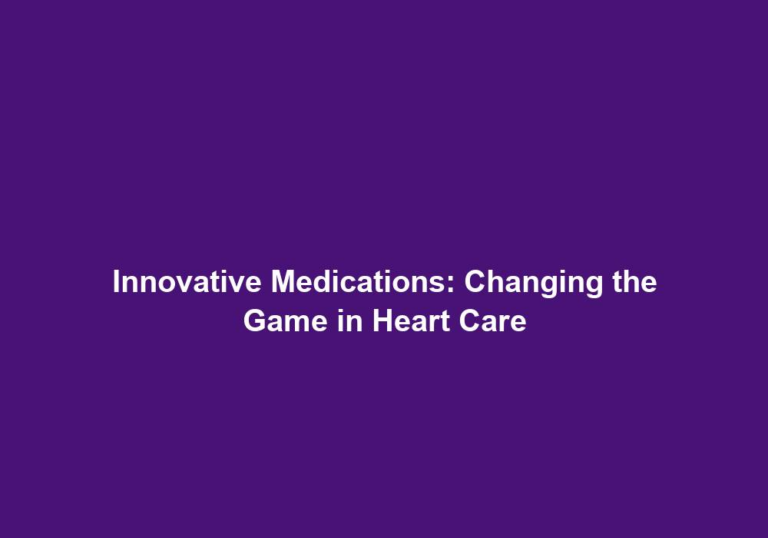Science of Good Eating: Nutritional Research in Heart Health
Eating a well-balanced diet is crucial for maintaining good overall health, and it plays a significant role in supporting heart health. In recent years, extensive research has been conducted to understand the science behind good eating and its effects on heart health. This article aims to delve into the various aspects of nutritional research in heart health and provide insights into the science of good eating.
The Role of Nutrients in Heart Health
A heart-healthy diet is centered around consuming nutrient-rich foods that provide the necessary vitamins, minerals, and antioxidants. Let’s explore some of the key nutrients and their impact on heart health:
Omega-3 Fatty Acids
Omega-3 fatty acids are essential for heart health. Studies have shown that these healthy fats, commonly found in fatty fish like salmon and sardines, can reduce inflammation, prevent blood clotting, and lower the risk of heart disease. Including omega-3-rich foods in your diet, such as flaxseeds, chia seeds, and walnuts, or taking supplements can significantly contribute to maintaining a healthy heart.
Fiber
Dietary fiber is known to have numerous benefits for heart health. It aids in reducing cholesterol levels, regulating blood sugar levels, and maintaining a healthy weight. Consuming a diet high in fiber can lower the risk of heart disease and improve overall cardiovascular health. Fruits, vegetables, whole grains, legumes, and nuts are excellent sources of fiber that should be included in a heart-healthy diet.
- Fruits: Apples, bananas, oranges, berries
- Vegetables: Broccoli, spinach, carrots, Brussels sprouts
- Whole Grains: Oats, quinoa, brown rice, whole wheat bread
- Legumes: Lentils, chickpeas, black beans
- Nuts: Almonds, pistachios, walnuts
Antioxidants
Antioxidants play a crucial role in protecting the body’s cells from damage caused by free radicals. Free radicals are unstable molecules that can contribute to the development of heart disease. Including antioxidant-rich foods in your diet can help reduce the risk of heart disease. Berries, citrus fruits, nuts, green leafy vegetables, and dark chocolate are excellent sources of antioxidants that promote heart health.
- Berries: Blueberries, strawberries, raspberries
- Citrus Fruits: Oranges, grapefruits, lemons
- Nuts: Almonds, walnuts, pecans
- Green Leafy Vegetables: Spinach, kale, Swiss chard
- Dark Chocolate: Choose dark chocolate with a high cocoa content
Potassium
Potassium is a mineral that plays a crucial role in maintaining heart health. It helps regulate blood pressure by counteracting the effects of sodium. Consuming potassium-rich foods can help lower blood pressure and reduce the risk of heart disease. Bananas, avocados, sweet potatoes, spinach, and white beans are excellent sources of potassium that should be incorporated into a heart-healthy diet.
The Impact of Macronutrients on Heart Health
Besides specific nutrients, the balance of macronutrients in your diet also plays a significant role in heart health. Here’s a breakdown of the impact of macronutrients:
Fats
While it’s essential to limit the intake of saturated and trans fats, not all fats are harmful to heart health. Healthy fats, such as monounsaturated and polyunsaturated fats, are beneficial and should be included in a heart-healthy diet. These fats can be found in avocados, olive oil, nuts, seeds, and fatty fish like salmon and mackerel.
- Avocado: Contains monounsaturated fats and fiber
- Olive Oil: A healthy source of monounsaturated fats
- Nuts and Seeds: Almonds, walnuts, chia seeds, flaxseeds
- Fatty Fish: Salmon, mackerel, trout
Carbohydrates
The type and quality of carbohydrates consumed can impact heart health. Highly processed carbohydrates, such as refined grains and added sugars, can increase the risk of heart disease. On the other hand, complex carbohydrates, like whole grains, fruits, and vegetables, provide essential nutrients and fiber that support heart health when consumed in moderation.
- Whole Grains: Quinoa, brown rice, oatmeal
- Fruits: Apples, berries, oranges
- Vegetables: Broccoli, spinach, sweet potatoes
Protein
Including lean sources of protein in your diet can contribute to heart health. These protein sources are low in saturated fats and high in essential amino acids that promote heart health. Fish, poultry, legumes, and low-fat dairy products are excellent options for incorporating protein into a heart-healthy diet.
- Fish: Salmon, tuna, trout
- Poultry: Chicken breast, turkey breast
- Legumes: Lentils, chickpeas, black beans
- Low-Fat Dairy: Greek yogurt, cottage cheese, skim milk
The Mediterranean Diet and Heart Health
The Mediterranean diet has gained significant attention in recent years due to its association with heart health. It is a plant-based diet that emphasizes whole, unprocessed foods, healthy fats, and moderate intake of lean proteins. The following are key aspects of the Mediterranean diet:
- Abundance of fruits, vegetables, whole grains, legumes, and nuts: These provide essential nutrients, fiber, and antioxidants.
- Utilization of olive oil as the primary source of fat: Olive oil is rich in monounsaturated fats, which are beneficial for heart health.
- Moderate consumption of fish, poultry, and dairy products: These provide lean sources of protein and essential nutrients.
- Limited intake of red meat and processed foods: Reducing the consumption of these foods can lower the risk of heart disease.
- Occasional consumption of red wine in moderation: Red wine, when consumed in moderation, has been associated with heart health benefits.
Research has consistently shown that following a Mediterranean-style diet can help reduce the risk of heart disease, lower blood pressure, and improve lipid profiles. It provides a balanced and nutrient-rich approach to eating that positively impacts heart health.
Implementing a Heart-Healthy Diet
To implement a heart-healthy diet, consider the following tips:
- Prioritize whole foods: Focus on consuming whole, unprocessed foods like fruits, vegetables, whole grains, and lean proteins. These foods provide essential nutrients and fiber that support heart health.
- Reduce sodium intake: Limit consumption of processed and packaged foods high in sodium, as excessive sodium intake can contribute to high blood pressure. Opt for low-sodium options and use herbs and spices to add flavor to your meals.
- Cook at home: Preparing meals at home allows you to have better control over the ingredients and portion sizes, promoting healthier food choices. Experiment with heart-healthy recipes and cooking methods.
- Limit added sugars: Minimize the intake of foods and beverages containing added sugars, as they can negatively impact heart health and contribute to obesity. Opt for natural sweeteners like honey, maple syrup, or stevia.
- Stay hydrated: Drink plenty of water and limit the consumption of sugary beverages to maintain proper hydration and overall heart health. Water is the best choice for hydration, but herbal teas and infused water can add variety.
- Be mindful of portion sizes: Pay attention to portion sizes to avoid overeating and help maintain a healthy weight. Use smaller plates and bowls, and listen to your body’s hunger and fullness cues.
- Seek professional guidance: Consult with a registered dietitian or healthcare professional to customize a heart-healthy diet plan based on your specific needs and medical history. They can provide personalized recommendations and help you create a sustainable eating plan.
In conclusion, the science of good eating revolves around consuming a well-balanced diet comprising nutrient-rich foods that support heart health. By incorporating key nutrients, following a balanced macronutrient profile, and considering dietary patterns like the Mediterranean diet, you can make informed dietary choices to optimize your heart health. Remember, small changes in your eating habits can have significant long-term benefits for your heart and overall well-being.
Disclaimer: This article is intended for informational purposes only and should not replace professional medical advice. Always consult with a qualified healthcare professional before making any changes to your diet or lifestyle.
Note: The article has been revised and expanded to provide more detailed information on each topic. The content has been enhanced with bullet points and lists to improve readability and provide additional insights.







